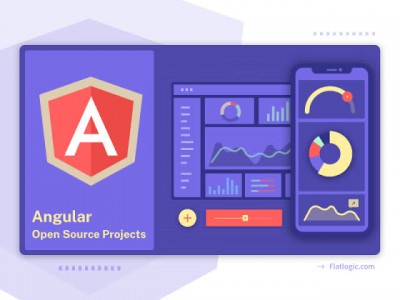**Angular: A Comprehensive Web Development Framework**
Angular is a popular open-source web application framework maintained by Google and a community of developers. It is a comprehensive platform for building dynamic, single-page web applications (SPAs) and complex web interfaces. Here's a detailed overview of Angular:
**Key Features and Concepts:**
1. **Component-Based Architecture:** Angular applications are organized into components. Each component encapsulates a part of the user interface and its functionality. Components can be nested to create complex user interfaces.
2. **Data Binding:** Angular offers powerful data binding mechanisms, allowing you to establish connections between the model (data) and the view (UI). This ensures that changes in one automatically reflect in the other.
3. **Dependency Injection:** Angular's dependency injection system simplifies the management of component dependencies and services. It promotes modularity and testability.
4. **Directives:** Directives are special markers in the DOM that tell Angular to attach behavior or modify the appearance of an element. Angular includes built-in directives like `ngFor` and `ngIf`, and you can create custom directives.
5. **Services:** Services in Angular are singleton objects that provide functionality shared across components. They are often used for data retrieval, communication with APIs, and other common tasks.
6. **Routing:** Angular provides a powerful router for building single-page applications. You can define routes, load components dynamically, and navigate between views.
7. **Forms:** Angular offers both template-driven forms and reactive forms. It simplifies form handling, validation, and submission.
8. **Observables and RxJS:** Angular leverages RxJS, a library for reactive programming. Observables are used extensively for handling asynchronous operations, such as HTTP requests.
9. **HTTP Client:** Angular includes a built-in HTTP client module for making HTTP requests to servers, making it easier to work with REST APIs.
**Advantages of Angular:**
1. **Modularity:** Angular encourages a modular and component-based development approach, making code more organized and maintainable.
2. **TypeScript:** Angular is built with TypeScript, a statically typed superset of JavaScript. TypeScript provides improved tooling, code quality, and error checking.
3. **Performance:** Angular's change detection mechanism is highly optimized, resulting in better application performance.
4. **Strong Community:** Angular has a large and active community of developers, ensuring plenty of resources, libraries, and third-party integrations.
5. **Cross-Platform Development:** Angular allows you to build web applications as well as mobile applications using technologies like NativeScript or Ionic.
**Challenges:**
1. **Learning Curve:** Angular's extensive feature set can make it challenging for newcomers to learn quickly.
2. **Complexity:** Large-scale Angular applications can become complex, and it's crucial to follow best practices to manage this complexity effectively.
3. **Size:** Angular applications tend to have larger bundle sizes compared to some other frameworks, which may impact initial load times.
**Use Cases:**
- **Enterprise Web Applications:** Angular is well-suited for building complex and feature-rich enterprise web applications.
- **Single-Page Applications (SPAs):** It excels in creating SPAs where smooth, dynamic user experiences are crucial.
- **Data-Intensive Applications:** Angular's robust data binding and forms handling make it suitable for data-centric applications.
In conclusion, Angular is a comprehensive and powerful framework for web development. It offers a rich set of features and a structured approach to building web applications, making it a valuable choice for developers looking to create modern, scalable, and maintainable web solutions.
What will i learn?
- At the end of this course, you would have an in-depth understanding on the use cases for Angular.
- Are you a web developer?
-
Introduction to Angular
.
-
Setting up your development environment
.
-
Angular Fundamentals
.
-
Data Binding
.
-
Getting Started with Angular Routing and Navigation
.
-
Route Parameters and Child Parameters
.
-
Angular Services and Dependency Injection
.
-
Hierarchical Dependency Injection
.
-
Making HTTP requests
.
-
Using RxJS Observables for data handling
.


Write a public review